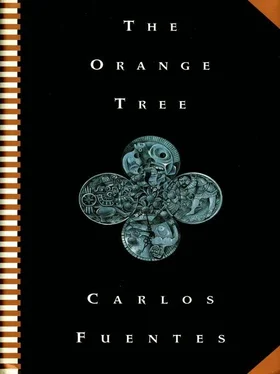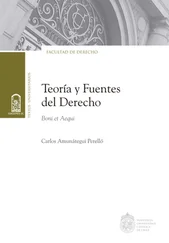But my eyes don’t manage to close in peace, thinking above all about the abundance of protection, arms, men, and horses that accompanied the gold and silver of Mexico back to Spain — a cruel contrast to the insecurity, slim resources, and small number of soldiers with which Cortés and his men came from Cuba in the first moment of this dubious exploit. And yet, just look at the ironies of history.
Quiñones, captain of Cortés’s personal guard, sent to protect the treasure, crossed the Bahamas but stopped at the island of Terceira with the booty of Mexico. He fell in love with a woman there, and was stabbed to death because of it; while Alonso de Dávila, who led the expedition, crossed the path of the French pirate Jean Fleury, whose nickname among us is Juan Florín, who stole the gold and silver and imprisoned Dávila in France, where King Francis I had declared again and again, “Show me the clause in Adam’s testament in which the king of Spain is given half the world,” to which his corsairs answered in chorus: “When God created the sea, he gave it to all of us without exception.” And as a moral to the story: Florín or Fleury was himself captured on the high seas by Basques (Valladolid, Burgos, the Basque Country: the Discovery and Conquest finally united and mobilized all Spain!) and hanged in the port of Pico …
And the thing doesn’t end there, because a certain Cárdenas, a pilot born in the Triana district of Seville and a member of our expedition, denounced Cortés in Castile, saying that he’d never seen a land where there were two kings as there were in New Spain, since Cortés took for himself, without any right to it, as much as he sent to His Majesty. For his declaration, the King gave this man from Triana a thousand pesos in rents and a parcel of Indians.
The bad thing is that he was right. We were all witnesses to the way our commander took the lion’s share and promised us soldiers rewards at the end of the war. May it be long in coming! So we were left, after sweating our teeth out, without a pot to piss in … Cortés was sentenced and deprived of power; his captains lost their lives, their freedom, and, what’s worse, the treasure, which ended up scattered to the four corners of Europe …
Is there any justice, I ask myself, in all this? Did we do nothing more than give the gold of the Aztecs a better destiny by pulling it out of its sterile occupation and spreading it around, distributing it, conferring on it an economic purpose instead of an ornamental or sacred one, putting it into circulation, melting it down the better to see it melt away?
[8]
From my grave, I try to judge things calmly; but one image forces itself on my thoughts again and again. I see before me a young man, about twenty-two years old, of clear, dark complexion, of a very noble disposition, both in body and in facial features.
He was married to one of Moctezuma’s nieces. He was called Guatemuz or Guatimozín and had a cloud of blood in his eyes. Whenever he felt his vision blur, he lowered his eyelids, and I saw them: one was gold and the other silver. He was the last emperor of the Aztecs, after his uncle Moctezuma was stoned to death by the disillusioned mob. We Spaniards killed something more than the power of the Indians: we killed the magic that surrounded it. Moctezuma did not fight. Guatemuz — let it be said to his honor — fought like a hero.
Captured with his captains and brought before Cortés on August 13, at the hour of vespers on Saint Hippolytus Day in the year 1521, Guatemuz said that in the defense of his people and vassals he’d done everything he was obliged to do out of honor and (he added) also out of passion, strength, and conviction. “And since I’ve been brought by force, a prisoner,” he said then to Cortés, “before your person and power. Take that dagger you wear on your belt and kill me with it.”
This young, valiant Indian, the last emperor of the Aztecs, began to weep, but Cortés answered him that for being so brave he should come in peace to the fallen city and govern in Mexico and in its provinces as he had before.
I know all this because I was the translator of the interview between Cortés and Guatemuz, who could not understand each other alone. I translated as I pleased. I didn’t communicate to the conquered prince what Cortés really said, but put into the mouth of our leader a threat: “You will be my prisoner; today I will torture you by burning your feet and those of your comrades until you confess where the rest of your uncle Moctezuma’s treasure is (the part that didn’t end up in the hands of French pirates).”
I added, inventing on my own and mocking Cortés: “You’ll never be able to walk again, but you’ll accompany me on future conquests, crippled and weeping, as a symbol of continuity and the source of legitimacy for my enterprise, whose banners, raised on high, are gold and fame, power and religion.”
I translated, I betrayed, I invented. Right then and there, Guatemuz’s tears dried, and instead of tears, down one cheek ran gold and down the other silver, cutting a furrow in them as a knife would, leaving a permanent wound in them which, may it please God, death has healed.
Since my own death, I remember that vespers of Saint Hippolytus, recorded by Bernal Díaz as an eternal night of rain and lightning, and I reveal myself before posterity as a falsifier, a traitor to my commander Cortés, who instead of making a peace offering to the fallen prince offered him cruelty, continued oppression without mercy, and eternal shame for the conquered.
But since things happened as I’d said, my false words becoming reality, wasn’t I right to translate the commander backwards and tell the truth with my lies to the Aztec? Or were my words perhaps a mere exchange and I nothing more than the intermediary (the translator), the mainspring of a fatal destiny that transformed trick into truth?
On that Saint Hippolytus night, playing the role of translator between the conquistador and the conquered, I merely confirmed the power of words: I used them to say the opposite of what Cortés said only to express what he actually did. I’d acquired a knowledge of the soul of my commander, Hernán Cortés, a dazzling mix of reason and folly, will and weakness, skepticism and fantastic naïveté, good luck and bad, gallantry and jest, virtue and malice — all those things went into the man from Estremadura, the conqueror of Mexico whom I’d followed from Yucatan to Moctezuma’s court.
The powers of folly and foolishness or malice and good fortune when they’re not in harmony, when they’re only words, can turn our intentions upside down. The story of the last Aztec king, Guatemuz, ended with him not in the place of power promised by Cortés, not in the honor with which the Indian surrendered, but in a cruel comedy, the very one I’d invented and made inevitable with my lies. The young emperor was the king of fools, dragged without feet by the victor’s chariot, crowned with cactus, and finally hanged upside down from the branches of a sacred silk-cotton tree like a hunted-down animal. What happened was exactly what I had lyingly invented.
For that reason I don’t sleep in peace. Possibilities not carried out, the alternatives of freedom all rob me of sleep.
A woman was to blame.
[7]
Among all the prodigies produced by my captain Don Hernán Cortés to impress the Indians — fire from harquebuses, steel swords, glass beads — none was so important as the horses of the conquest. A shotgun blast fades in smoke; a Spanish blade can be overcome by a two-handed Indian sword; glass may fool people, an emerald as well. But the horse exists, stands there, has a life of its own, moves, possesses the combined power of nerve, gloss, muscle, foaming mouth, and hooves. Those hooves, links to the earth, makers of thunder, twins of steel. Hypnotic eyes. The rider who gets on and off adds to the perpetual metamorphosis of the beast seen now but never before imagined, not, certainly, by the Indians, not even by a single one of their gods.
Читать дальше












